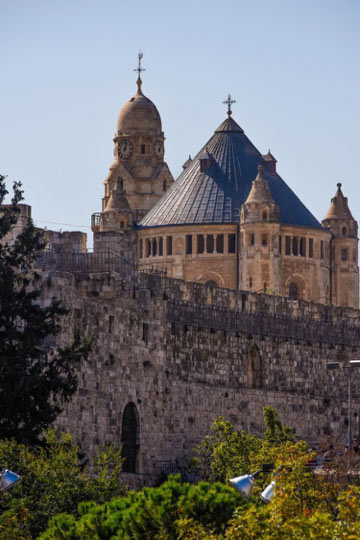
Master of Arts in Cultural Studies of Israel and Palestine
Explore the religious, political, and social history of the Middle East, including the world’s three great monotheistic religions: Judaism, Christianity, and Islam.
Cultural Studies of Israel and Palestine
About the Program
What You Will Learn
Our M.A. degree in Cultural Studies of Israel and Palestine (formerly Middle Eastern Cultures and Religions) is an interdisciplinary program that combines studies in religion, language, history, and social sciences, and provides students opportunities for field education.
Students pursuing this degree are able to utilize the wealth of institutional and personal resources available for study and interaction in Jerusalem.
Unique Opportunities at JUC
Both in and out of the classroom, our students encounter a variety of viewpoints first-hand regarding the character of the countries of the region and their current political processes. The rare combination of Israeli and Palestinian scholars, together with local Christian faculty members teaching in a non-denominational Christian institution located in Jerusalem, makes Jerusalem University College a unique meeting place for examining and interacting with issues surrounding the modern Middle East.
Ready to Apply?
Follow the link below to submit your application to JUC.
Start your applicationTHE DETAILS
Course Requirements
The M.A. degree in Cultural Studies of Israel and Palestine (formerly Middle Eastern Cultures and Religions) includes 48 semester credit hours of course work as outlined below. The degree is designed to be completed within two calendar years, although students choosing to pursue the thesis track are granted an additional year. Students with a documented learning disability or for whom English is not their native language are expected to finish the degree in three years if taking the non-thesis track, or four years if pursuing the thesis track. Up to 24 credits of approved graduate-level courses may be transferred in from another degree program if approved by the JUC Academic Committee. At least half of the program must be completed in-residence.
*The course requirements below are updated and will go into effect for students matriculating in the Fall of 2026. Students who have matriculated prior to Fall 2026 can choose which program track to matriculate into and should contact the Registrar with questions. View previous MECR requirements here.
Internship
Students are required to complete an intensive internship course (3 credit hours) which includes 100 contact hours at an approved area ministry, NGO, or comparable placement, together with a written component produced by the student. The internship is designed to provide an opportunity for students to develop and refine practical skills necessary for leadership in the Middle East. It does this by integrating classroom learning with practical field experiences. For this reason, each internship placement is closely matched to the individual student’s academic program and vocational goals.
Society: 9 hours
- Introduction to the Modern Middle East (3)
- Palestinian Society and Politics (3)
- Historical and Social Settings of Modern Israel (3)
Geography: 4 hours
- Physical Settings of the Bible (4) OR Historical & Geographical Settings of the Bible + Jordan Extension (4)
History: 6 hours
- History of the Jews During the Medieval and Modern Period (3)
- History of the Holy Land from the Rise of Islam to 1948 (3)
Religion: 9 hours
- Jewish Thought and Practice (3)
- Islamic Thought and Practice (3)
- History of the Church in the East (3)
Modern Language: 6 hours of Arabic or Hebrew
- Colloquial Arabic I (3)
- Colloquial Arabic II (3)
- Modern Hebrew I (3)
- Modern Hebrew II (3)
Seminar: 3 hours
- CSIP Seminar (3)
Internship: 3 hours
Elective: 3 hours total
- Biblical Archaeology II (3) OR Archaeology of Jerusalem II (3)
- Biblical Jerusalem and Its Explorations (Online) (3)
- Cultural Background of the Bible (3)
- History of the Second Temple Period (3)
- Hermeneutics of Old Testament Texts in Jewish and
Christian Tradition (3) - Text Studies in Midrash, Mishnah, and Gemara: The
Shared Heritage of Rabbinic Judaism and Early Christianity (3) - Guided Research in Cultural Studies of Israel and Palestine (3)
- Second langauge track (Modern Hebrew or Colloquial Arabic)
Thesis-track degree: 6 hours
Non-Thesis-track degree: 6 additional hours of elective courses
Bible Content Examinations
- Old Testament Bible Content Examination
- New Testament Bible Content Examination
Comprehensive - Integrative Examinations
- Contemporary Issues in Cultural Studies of Israel and Palestine
- Modern Hebrew Examination OR colloquial Arabic Examination
Total Credit Hours: 49
Thesis Track
M.A. students may choose to write a thesis as part of their degree program. Once a topic of interest is chosen, the student will work with two faculty members to develop a thesis proposal, then research and write the thesis. The process of writing a thesis not only allows the student to engage a topic in depth, but also to learn methods of research and writing that allow the student to pursue further academic work.
Sample Thesis Titles
The Aramean Christian Movement in Israel
The Dhimma: Aspects and Impacts on Christian Communities in the Middle East
Bethlehem University: A Case Study in the Develop of Higher Education in the Midst of Political Struggle
The Contribution of British Evangelical Thought to the Making of the Balfour Declaration
A Study of British Policy Affecting Jewish Refugees From the Third Reich: 1933-1939
Ready to Learn More?
Contact us with any questions you have and we'll be in touch!







